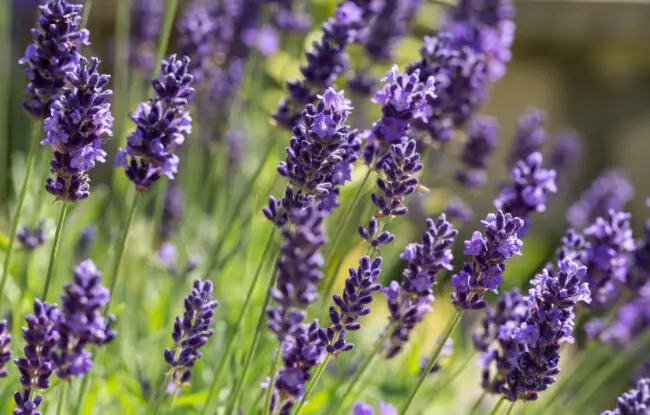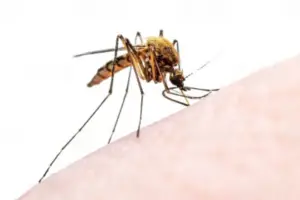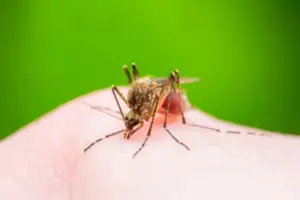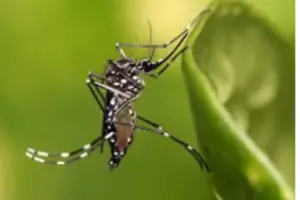Today, we’re delving into the world of lavender, one of the most popular and scientifically proven plants known for repelling mosquitoes. Home gardeners often rely on Lavandula angustifolia, commonly known as lavender, to deter grazing animals like deer and rabbits.
While the plants themselves offer limited mosquito-repelling properties, the real gem lies in their essential oil.
Lavender essential oil contains a compound called linalool, which emits a pleasant scent to humans but is detested by mosquitoes.
The overpowering aroma overwhelms their sensitive olfactory organs, similar to the action of DEET.
According to a 2009 study, lavender oil demonstrated an impressive 93% repellant rate against indoor mosquitoes and a still commendable 53% rate when used outdoors.
As part of a comprehensive natural repellent approach, lavender oil stands out as one of the most effective solutions for keeping mosquitoes at bay.

Does Lavender Repel Bugs?
Yes, lavender has the remarkable ability to repel fleas, moths, mosquitoes, and an array of other insects. Beyond the efficacy of its flower-extracted oil as a mosquito repellent, the lavender plant itself serves as a natural deterrent to unwelcome pests.
When adorning your outdoor seating spaces with lavender, it is prudent to remember to situate one close to any doorways, for this will effectively discourage flies from intruding and setting up habitat within your abode.
The Power of Lavender as a Natural Mosquito Repellent
Anecdotal sources and recent scientific research both point to lavender’s active compound as the reason for its effectiveness in repelling mosquitoes.
These sources also suggest that combining lavender oil with other natural repellents, such as cinnamon oil, tea tree oil, or citronella oil, enhances its mosquito-repelling properties.
A study from Colorado State University supports this belief, recommending the combination of lavender oil with these other oils to create a potent yet pleasant-smelling mosquito shield.
Apart from its mosquito-repelling qualities, lavender is highly admired for its visual appeal in flower gardens. Its rich violet color during blooming sets it apart from other flowers.
Related Post: How Long Do Mosquitoes Live: Understanding Mosquito LifeSpan
Moreover, thanks to its unique chemical composition, lavender not only protects itself but also safeguards its surroundings effectively. As a result, incorporating lavender into a flower garden not only adds beauty but also contributes to practical mosquito control.
Varieties of Lavender and Where to Acquire Them
Lavender displays a delightful array of subtypes, each boasting resplendent purple flowers that are not only aesthetically pleasing but also serve practical purposes.
For instance, Lavandula angustifolia possesses a remarkable ability to concentrate its bitter linalool compound, deterring pests from feasting on its vivid blooms.
To ensure thriving growth, lavender necessitates well-ventilated conditions with ample sunlight and air circulation.
Expert horticulturists recommend planting individual lavender specimens approximately one foot apart in alkaline soil, maintaining a pH level between 6.7 and 7.3, while also emphasizing the importance of proper drainage to prevent fungal issues.
Although scientific investigations have yet to delve fully into this realm, there is anecdotal evidence suggesting that the mere presence of lavender plants can emit sufficient ambient linalool to deter small swarms of mosquitoes.
For the most vibrant lavender blooms, local plant nurseries are an ideal source. However, for those embarking on the journey of cultivating their lavender patch from scratch, acquiring seeds is possible through this link.
Related Post: Why Do Mosquitoes Exist? Role Of Mosquitoes In Our Ecosystem
Lavender Essential Oil
When it comes to repelling mosquitoes, lavender’s essential oil stands out as an effective indoor and outdoor solution.
The secret to its efficacy lies in the elevated concentrations of linalool, which can reach up to 25%, depending on the oil’s composition.
Consequently, utilizing or creating this type of essential oil can significantly reduce the frequency of mosquito bites.
Individuals interested in trying pure lavender essential oil can find it available for purchase online via this source.
How to Make Homemade Lavender Essential Oil
Moreover, crafting homemade lavender essential oil from lavender plants grown in one’s own yard is also a feasible option. Follow these preparation steps:
1. Boil 1.5 cups of olive oil.
2. Add 2 cups of lavender plants (including buds and stems) and simmer for 30 minutes.
3. Cool and strain the mixture twice—once through a colander and once with a coffee press.
4. Refrigerate the strained oil in an airtight container until the mixture becomes cloudy.





